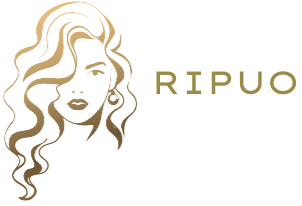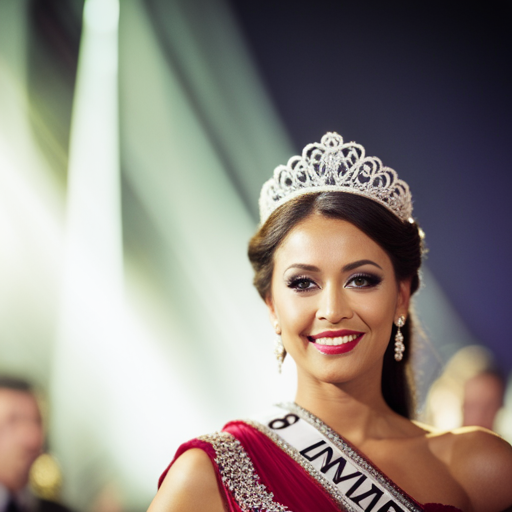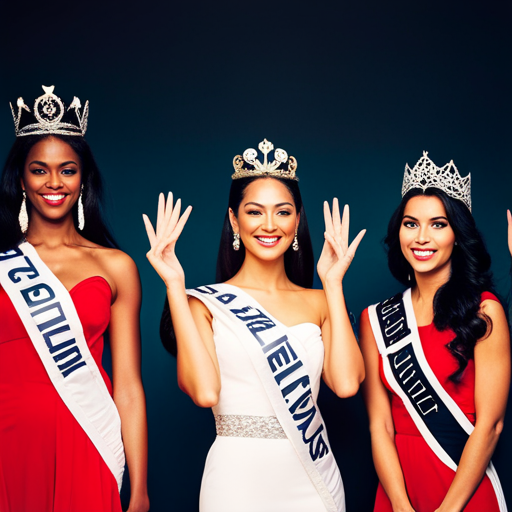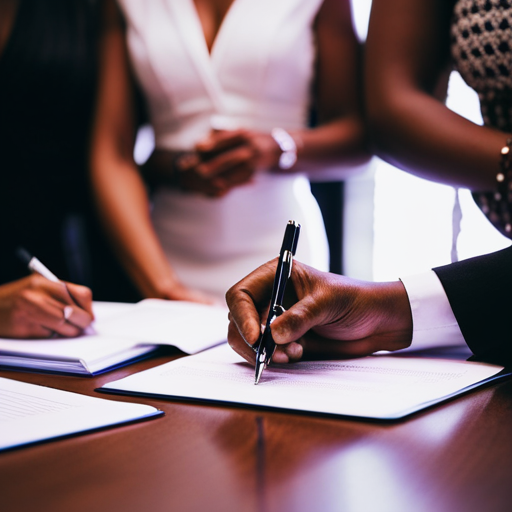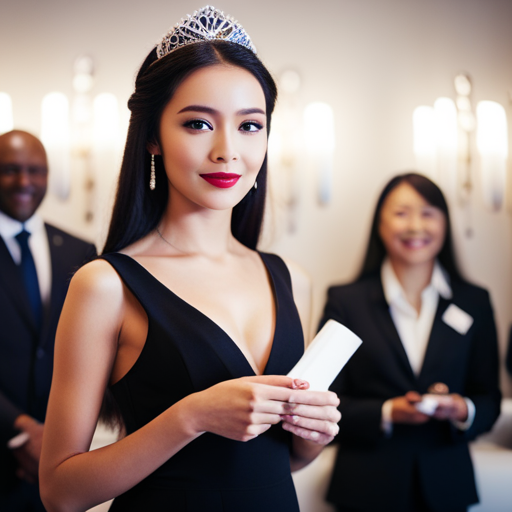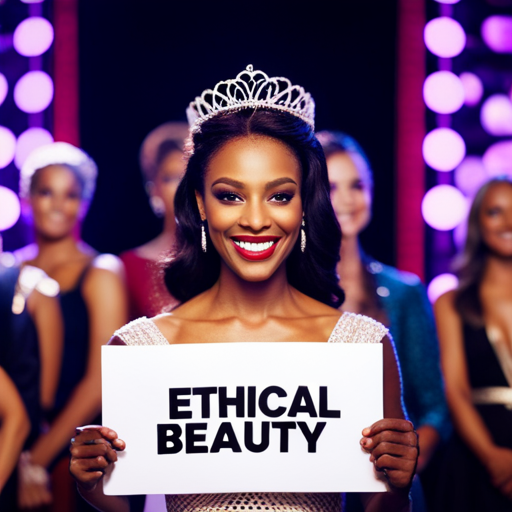The Influence of Media on Beauty Pageants
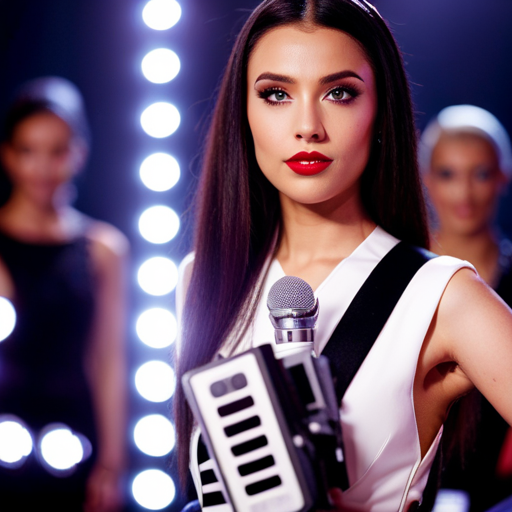
In a world where the spotlight often shines on physical appearance, the influence of media on beauty pageants has become increasingly significant.
Like the carefully crafted composition of a painting, the portrayal of beauty pageants in media has evolved over time, reflecting societal norms and values.
This article delves into the intricate relationship between media and beauty pageants, exploring the impact of historical evolution, social media, and television on shaping beauty ideals.
Historical Evolution of Beauty Pageants
The historical evolution of beauty pageants has gradually and significantly transformed over the past century, reflecting the changing societal norms and values.
What originated as simple physical beauty contests has evolved into a multifaceted cultural phenomenon with global reach. The early 20th century saw beauty pageants primarily focusing on physical attractiveness, with contestants judged solely on their looks.
However, as societal perspectives shifted, these pageants began to incorporate talent competitions, intelligence assessments, and humanitarian endeavors, emphasizing a more holistic representation of beauty.
This evolution speaks to the cultural significance of beauty pageants, as they mirror the broader societal changes in attitudes towards beauty, gender roles, and individuality.
Moreover, beauty pageants have become platforms for addressing social issues, promoting diversity, and empowering women, underscoring their evolving cultural relevance.
As beauty pageants continue to adapt to contemporary values, their historical evolution underscores their ability to both influence and be influenced by the cultural landscape, making them an intriguing subject of study in the context of media and societal trends.
Media Representation of Beauty Standards
Representation in media of beauty standards reflects societal ideals and influences perceptions of attractiveness and femininity. Media portrayal of beauty standards has a profound impact on shaping cultural norms and expectations. Through various forms of media such as advertising, fashion spreads, television shows, and social media, certain beauty standards are perpetuated and reinforced. These standards often emphasize specific physical attributes, such as a slim figure, flawless skin, and symmetrical facial features, which can contribute to an idealized and often unrealistic portrayal of beauty.
The cultural influence of media representation also extends to the concept of femininity, as it often associates beauty with traits like passivity, submissiveness, and delicacy.
Moreover, the underrepresentation of diverse beauty standards in the media can lead to a limited and narrow understanding of attractiveness, excluding individuals who do not fit the conventional mold. This can have detrimental effects on individuals’ self-esteem and body image, perpetuating feelings of inadequacy and insecurity.
Therefore, it is essential for the media to strive for more inclusive and diverse representations of beauty standards, acknowledging the multiplicity of beauty across different cultures and identities.
Impact of Social Media on Pageant Culture
The rise of social media has significantly impacted the culture of beauty pageants. It has influenced everything from contestant interactions to audience expectations. With the widespread use of platforms like Instagram and Twitter, beauty standards have evolved. These platforms often place greater emphasis on diversity and inclusivity. As a result, social media has become a powerful force in reshaping the traditional norms of pageant culture.
Social Media’s Role
Discussing the impact of social media on pageant culture reveals the significant influence of digital platforms on shaping beauty standards and contestant engagement.
-
Influencer Marketing: Social media has transformed the way beauty pageants are marketed. Contestants and pageant organizers often collaborate with influential social media personalities to promote the event, showcase contestants, and advocate for beauty standards.
-
Online Activism: Social media has become a platform for promoting diversity and challenging traditional beauty norms. Activists use hashtags, viral campaigns, and online discussions to advocate for inclusivity and representation in pageants, influencing the way pageants are organized and perceived.
-
Engagement and Interaction: Social media allows for real-time engagement between contestants, organizers, and audiences, creating a more immersive and interactive pageant experience. Contestants can connect with their supporters, share their journey, and build a personal brand, enhancing their overall pageant experience.
Changing Beauty Standards
The pervasive influence of social media on beauty pageants has significantly shifted beauty standards and contestant engagement.
Social media platforms have led to changing perceptions of beauty, with a greater emphasis on diversity and inclusivity. The pressure to conform to traditional beauty standards has been challenged as societal pressures evolve. Contestants are now using social media to promote body positivity and self-acceptance, influencing a more diverse representation of beauty in pageants.
Additionally, the immediacy of social media has transformed the way pageants are experienced, allowing for real-time interaction and feedback. This shift has prompted pageants to adapt their criteria and messaging to align with the changing landscape of beauty standards, ultimately fostering a more inclusive and empowering environment for contestants and audiences alike.
Psychological Effects on Contestants
The psychological effects on beauty pageant contestants can be profound and enduring. The pressure to conform to certain body image standards, combined with the intense scrutiny from the media, can lead to significant mental health impacts.
Furthermore, the relationship between self-esteem and media portrayal in beauty pageants is a complex and critical aspect to consider.
Body Image Pressure
Body image pressure often exerts a significant psychological impact on beauty pageant contestants, influencing their self-esteem and mental well-being. This pressure stems from societal expectations and the relentless pursuit of a specific body ideal, leading to detrimental effects such as low self-esteem, eating disorders, and emotional distress.
-
Low Self-Esteem: Contestants may experience a decline in self-worth as they internalize unrealistic beauty standards, impacting their confidence on and off the stage.
-
Eating Disorders: The pressure to maintain a certain physique may contribute to the development of eating disorders, posing serious risks to the contestants’ physical and mental health.
-
Emotional Distress: Constant scrutiny of their appearance can lead to heightened emotional distress, affecting their overall well-being and perpetuating a negative cycle of body image dissatisfaction.
In addressing these challenges, promoting body positivity and redefining beauty standards within the pageant industry is crucial to safeguarding the mental health of contestants.
Mental Health Impact
Amid the scrutiny and expectations perpetuated by media representations, beauty pageant contestants often contend with profound psychological effects on their mental well-being. The stigma and stereotypes associated with beauty pageants can significantly impact the self-worth and mental health of contestants.
The pressure to conform to narrow beauty standards and the constant judgment from the public and media can lead to feelings of inadequacy, anxiety, and depression among contestants. The relentless focus on physical appearance and the emphasis on perfection can exacerbate these negative effects, leading to long-term psychological consequences.
These detrimental effects highlight the importance of addressing the mental well-being of beauty pageant contestants and reevaluating the impact of media on their psychological health. These issues are closely linked to the contestants’ self-esteem and require a comprehensive understanding of the influence of media on their mental well-being.
Self-Esteem and Media
Contestants in beauty pageants often experience profound psychological effects from media representations, particularly in relation to their self-esteem. The constant exposure to idealized and often unrealistic standards of beauty portrayed in the media can significantly impact the self-esteem of contestants. This can lead to feelings of inadequacy and a distorted perception of self-worth. The pressure to conform to these standards can also contribute to mental health issues such as anxiety and depression.
Self-Esteem: Media representations can exacerbate feelings of low self-esteem among beauty pageant contestants, leading to a negative impact on their mental well-being.
Body Positivity: Media portrayal of ‘perfect’ bodies can create an environment where contestants feel pressured to attain unrealistic physical standards, potentially leading to body image issues.
Mental Health: The influence of media on beauty pageants can contribute to mental health challenges, highlighting the importance of promoting a more diverse and inclusive representation of beauty.
Role of Television in Shaping Beauty Ideals
Television plays a significant role in shaping beauty ideals by perpetuating certain standards of physical attractiveness and influencing perceptions of beauty. The influence of television on beauty expectations is pervasive, with the portrayal of idealized beauty standards shaping societal impact and cultural norms. Through television programming, advertisements, and beauty competitions, specific beauty ideals are promoted, often leading to unrealistic expectations and detrimental effects on individuals’ self-esteem and body image. The constant exposure to these narrow beauty standards on television can lead to a heightened emphasis on appearance and can contribute to the perpetuation of beauty stereotypes.
Television’s influence on beauty ideals also extends to the representation of diverse beauty standards. While there have been gradual improvements in showcasing a broader range of beauty on television, there is still a need for more inclusive and realistic representations of beauty. By portraying a more diverse range of body types, skin tones, and physical attributes, television can play a crucial role in reshaping beauty expectations and promoting a more accepting and inclusive beauty culture. This shift can have a positive impact on individuals’ perceptions of beauty and contribute to a more diverse and equitable society.
Diversity and Inclusivity in Pageant Media
With the growing societal emphasis on diversity and inclusivity, media’s role in shaping beauty pageants has become increasingly important. In today’s landscape, beauty pageants are making strides towards inclusive representation and cultural diversity through the influence of media. This is evident in several ways:
-
Representation: Media plays a pivotal role in showcasing a diverse range of contestants from various cultural backgrounds, breaking away from traditional beauty standards and promoting inclusivity. By highlighting contestants of different ethnicities, body types, and abilities, the media helps redefine the concept of beauty in pageants.
-
Platform for Voices: Through media coverage, beauty pageants have become a platform for contestants to share their stories, advocacies, and cultural heritage. This not only promotes inclusivity but also educates and empowers audiences about different cultures and perspectives.
-
Challenge Beauty Stereotypes: Media has the power to challenge existing beauty stereotypes by promoting contestants who represent diverse cultural norms and traditions. This not only enhances the overall appeal of beauty pageants but also fosters a more inclusive and accepting society.
Future Outlook: Redefining Beauty Pageants
The future outlook for beauty pageants is undergoing a transformative shift, reflecting evolving societal values and expectations. There is a growing recognition of the need to redefine standards of beauty and inclusivity within the pageant industry. This shift is being driven by a desire to move away from traditional, narrow beauty ideals towards a more inclusive and diverse representation of beauty.
Future inclusivity in beauty pageants is becoming a key focus, with an emphasis on celebrating individuals of all shapes, sizes, ethnicities, and backgrounds.
In the coming years, beauty pageants are expected to place a stronger emphasis on embracing a wider spectrum of beauty, encouraging contestants to be confident in their own skin, and promoting authenticity. This will likely lead to a redefinition of the judging criteria, placing less emphasis on physical appearance alone and more on character, intelligence, and the ability to inspire and make a positive impact.
The future of beauty pageants will likely see a shift towards empowering individuals to embrace their unique qualities, ultimately redefining the standards of beauty and inclusivity within the industry.
Frequently Asked Questions
How Do Beauty Pageants Impact the Mental Health of Contestants?
Beauty pageants can significantly impact the mental health of contestants, influencing their self-esteem and body image perception. Providing mental health support and challenging gender stereotypes is crucial to mitigate potential negative effects on contestants’ well-being.
What Role Do Beauty Pageants Play in Promoting or Challenging Traditional Beauty Standards?
Beauty pageants serve as a platform that can either perpetuate or challenge traditional beauty standards. Media portrayal plays a significant role in shaping the perception of beauty, influencing societal norms and ideals.
How Do Beauty Pageants Address Issues of Diversity and Inclusivity in Their Media Representation?
Beauty pageants strive to address issues of diversity and inclusivity in their media representation by showcasing a wide range of contestants from different backgrounds. Their media portrayal emphasizes the importance of representation and inclusivity in the beauty industry.
What Are the Potential Long-Term Effects of Beauty Pageants on Societal Beauty Ideals?
Beauty pageants have the potential to shape societal beauty ideals, impacting self-esteem and perpetuating narrow beauty standards. Media coverage can reinforce these perceptions, influencing how beauty is defined and internalized within society.
In What Ways Can Beauty Pageants Be Redefined in the Future to Promote a More Inclusive and Empowering Message?
In redefining beauty pageants, emphasis on inclusive representation and empowering messaging is crucial. This may involve diversifying judging criteria, promoting body positivity, and highlighting contestants’ achievements and advocacy work to inspire and uplift all individuals.
Conclusion
In conclusion, the influence of media on beauty pageants has been significant. It has shaped beauty standards and impacted contestants’ mental well-being. Additionally, media has perpetuated certain ideals through television and social media.
However, there is a growing movement towards diversity and inclusivity in pageant media. This movement challenges traditional beauty norms and seeks to promote a more inclusive representation of beauty. The future of beauty pageants may involve redefining beauty ideals and moving away from the narrow standards perpetuated by media. This shift would result in a more realistic and inclusive representation of beauty.
